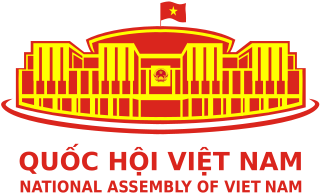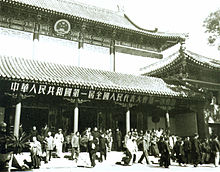
The Supreme Soviet of the Union of Soviet Socialist Republics was, beginning in 1936, the highest body of state authority of the Union of Soviet Socialist Republics (USSR), and based on the principle of unified power was the only branch of government in the Soviet state. Prior to 1936, the Congress of Soviets was the supreme legislative body. During 1989–1991 a similar, but not identical structure was the supreme legislative body. The Supreme Soviet appointed the Council of Ministers, the Supreme Court, and the Procurator General of the USSR as well as elected the Presidium which served as the USSR's collective head of state by the both 1936 and 1977 Soviet Constitution.

The Standing Committee of the National People's Congress (NPCSC) is the permanent body of the National People's Congress (NPC), the national legislature of China. Although the parent NPC officially has superiority over the Standing Committee, and certain authorities are not delegated, the Standing Committee is generally viewed to have more de facto power, as the NPC convenes only once a year for two weeks, leaving its Standing Committee the only body that regularly drafts and approves decisions and laws.

The speaker of a deliberative assembly, especially a legislative body, is its presiding officer, or the chair. The title was first used in 1377 in England.

The government of the People's Republic of China is based on a system of people's congress within the parameters of a unitary communist state, in which the ruling Chinese Communist Party (CCP) enacts its policies through people's congresses. This system is based on the principle of unified state power, in which the legislature, the National People's Congress (NPC), is constitutionally enshrined as "the highest state organ of power." As China's political system has no separation of powers, there is only one branch of government which is represented by the legislature. The CCP through the NPC enacts unified leadership, which requires that all state organs, from the Supreme People's Court to the President of the People's Republic of China, are elected by, answerable to, and have no separate powers than those granted to them by the NPC. The CCP controls appointments in all state bodies through a two-thirds majority in the NPC. The remaining seats are held by nominally independent delegates and eight minor political parties, which are non-oppositional and support the CCP. All government bodies and state-owned enterprises have internal CCP committees that lead the decision-making in these institutions.

The National Assembly of the Socialist Republic of Vietnam is the parliament and the highest body of state power of Vietnam. The National Assembly is the only branch of government in Vietnam and, in accordance with the principle of unified power, all state organs are subservient to it.

The vice president of the People's Republic of China, commonly called the vice president of China, is the deputy to the president of the People's Republic of China, the state representative of China.

The 9th National People's Congress (NPC) was in session from 1998 to 2003. It held five plenary sessions in this period. It followed the final session of the 8th National People's Congress. There were 2,979 deputies to this Congress.

The 8th National People's Congress (NPC) was in session from 1993 to 1998. It succeeded the 7th National People's Congress. It held five sessions in this period.

The 7th National People's Congress (NPC) was in session from 1988 to 1993. It held five sessions in this period.

The 6th National People's Congress (NPC) was in session from 1983 to 1988. It held five sessions in this period.

The 4th National People's Congress (NPC) was in session from 1975 to 1978. It held only one session, in January 1975, despite the Constitution mandating a session be held each year. There were 2864 deputies to this Congress.

The 2nd National People's Congress (NPC) was in session from 1959 to 1964. It held four sessions in this period.

The chairman of the Standing Committee of the National People's Congress is the presiding officer of the Standing Committee of the National People's Congress (NPCSC), which is the permanent body of the National People's Congress (NPC), the national legislature of China.

The Congress of People's Deputies of the Soviet Union was the highest body of state authority of the Soviet Union from 1989 to 1991.

The National People's Congress (NPC) is the highest organ of state power of the People's Republic of China. The NPC is the only branch of government in China, and per the principle of unified power, all state organs from the State Council to the Supreme People's Court (SPC) are subservient to it. With 2,977 members in 2023, it is the largest legislative body in the world. The NPC is elected for a term of five years. It holds annual sessions every spring, usually lasting from 10 to 14 days, in the Great Hall of the People on the west side of Tiananmen Square in Beijing.
The Presidium of the National People's Congress of the People's Republic of China is the presiding body of the National People's Congress (NPC) when its in session.

The president of the People's Republic of China, commonly called the president of China, is the state representative of the People's Republic of China, which on its own is a ceremonial office and has no real power in China's political system. However, since 1993, the post has been held by the general secretary of the Chinese Communist Party (CCP) and chairman of the Central Military Commission, who is China's de facto leader.
The Council of Chairpersons of the Standing Committee of the National People's Congress is a body which handles the daily affairs of the Standing Committee of the National People's Congress (NPCSC), which is the permanent body of the National People's Congress (NPC), the national legislature of China. It is composed of the chairman, the vice chairpersons, and the secretary-general of the NPCSC. It holds more frequent meetings than the NPCSC.
The 2023 National People's Congress, officially the First Session of the 14th National People's Congress, was held in March 2023 at the Great Hall of the People in Beijing, China. The session opened on 5 March and concluded on 13 March. Major state positions of China were elected in this session.











